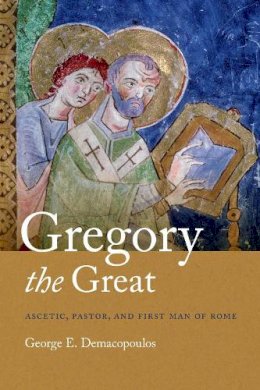George E. Demacopoulos is the Fr. John Meyendorff and Patterson Family Chair of Orthodox Christian Studies at Fordham University. He is the author and editor of a number of books, including Five Models of Spiritual Direction in the Early Church (University of Notre Dame Press, 2007).
"In his previous monographs George Demacopoulos has distinguished himself as a careful and informed interpreter of ancient pastoral practice and the development of papal authority. These two concerns merge in his new study, Gregory the Great: Ascetic, Pastor, and First Man of Rome, in which Demacopoulos argues for an integrative approach to Gregory that links his ascetical and pastoral theologies to his public activities. This is an original and important book, based on the full range of Gregory’s writings and exhaustive examination of the secondary sources. It should be of interest to a wide audience of classicists, late-antique and medieval historians, and theologians." —David G. Hunter, Cottrill-Rolfes Chair of Catholic Studies, University of Kentucky “It reminds one just how influential Gregory’s writings were in the Middle Ages. It also prods one to see the story of Benedict in the Dialogues in a different way. As Demacopoulos argues, Benedict is an example of an ascetic who gave up his solitude (more than once) to assume pastoral care for others.” —American Benedictine Review “Demacopoulos writes an important account of Gregory the Great (540-604), an important figure in Church history who was by turns theologian, pope, mystic, liturgical reformer, and benefactor. The author makes an argument for the deep intellectual and spiritual connections between two different aspects of Gregory: the theologian focused on asceticism and the shrewd administrator of the Church of Rome.” —Library Journal “By anyone’s account Gregory the Great is a seminal figure in Christian history. Straddling the fence between the late antique/patristic world and the early Middle Ages, Gregory is either the last great (pun intended!) early church father or the first great medieval theologian. Both perspectives are accurate and defensible, and George Demacopoulos tells us why and much more. . . Book teachers (and readers) now have an engaging, accessible, and well written introduction to the incomparable Gregory the Great.” —Comitatus “Gregory’s administration and expansion of the Roman church is best understood, Demacopoulos argues, as an extension of his ascetic convictions; his desire to have ascetics in leadership, his emphasis on the virtue of humility and obedience, and his expression of Petrine supremacy are all rooted in his ascetic convictions. This book is an excellent contribution to the literature on Gregory’s pontificate.” —Choice "Gregory the Great: Ascetic, Pastor, and First Man of Rome has the potential to be the most important intellectual biography of Pope Gregory I to appear since the publication in 1988 of Carole Straw's landmark study, Gregory the Great: Perfection in Imperfection. Demacopoulos proposes a new interpretive paradigm by insisting that the 'problem of the two Gregories' is not really a problem at all: Gregory's ascetic and pastoral theology, he argues, informs and structures his administrative practices. This important insight will have significant impact on future research." —Kristina Sessa, Ohio State University “Demacopoulo’s aim is to erase the line that previous scholars have drawn between Gregory’s personal asceticism on the one hand and his work as pastor and Roman statesman on the other.” —America “. . . this study provides a new integrated paradigm for interpreting the life of Gregory the Great without insisting on the problem of the two Gregory’s: there is only one Gregory whose ascetic and pastoral theology informed and structured his administrative practice. . . . For those uninformed about Gregory this book is a good introduction and for those who know Gregory’s life and writings this work may prove to be an honest challenge of commonly held assumptions.” —Worship “[Demacopoulos’] research is a welcome addition to scholarship on papal authority and politics in general, and Gregory I in particular. Moreover, the detailed scholarship . . . makes this volume suitable for advanced readers (scholars and graduate students), while the readable prose and clear narrative structure allow educated non-specialists to follow the argument. . . . Demacopoulos has created an important piece of scholarship that charts a new course in our understanding of Gregory the Great.” —The Historian "One puts this book down thinking about its subject in a new way, for Demacopoulos has been able to use the structure of Gregory’s thought to make sense of its author. Softening as he does the caesura of Gregory’s exchanging secular for religious life, Demacopoulos allows us to see his life as having been less disjointed than it has hitherto seemed to be, for the skills he had exercised in his early days as prefect of the city would be useful when he became pope." —Marginalia

